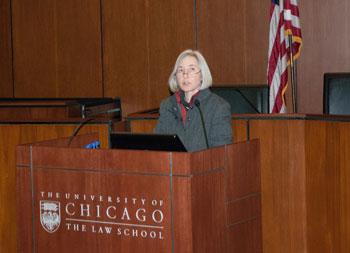Making Room for Forgiveness in Law

Despite its limitations, forgiveness could play a powerful role in law by offering people chances to come together, move forward, and turn suffering into opportunities for growth, Harvard Law School Dean Martha Minow said at Part II of the 2014-15 Brennan Center Jorde Symposium, which was held at the Law School earlier this month. In a talk titled, “Forgiveness, Law, and Justice,” Minow drew from religion, psychology, politics, and philosophy to explore the struggles and advantages in connecting the three.
“An attendant harm should be met with a consequence — this idea is central to law,” said Minow, the Morgan and Helen Chu Professor of Law at Harvard. “Courts and legislatures speak to our highest hopes for fairness, predictability, equality, freedom from bias, and corruption. Forgiveness often seems antagonistic to these very goals and can jeopardize the appearance, if not the reality, of law’s evenhandedness. Yet, I don’t think these concerns should halt the inquiry. … Law can be a tool for harmony, for compassion, for human growth, and for converting suffering into opportunity, as well as a mechanism for the predictable application of rules.”
The Jorde Symposium, an annual two-part event, was created in 1996 to sponsor top scholarly discourse and writing from a variety of perspectives on issues that were central to the legacy of William J. Brennan, Jr. The fall lecture is typically held at the University of California at Berkeley, Boalt Hall, where benefactor Thomas M. Jorde taught for many years. The spring lecture is at a different law school every year. Commentaries to the January lecture were delivered by Martha C. Nussbaum, the Ernst Freund Distinguished Service Professor of Law and Ethics, and Professor Aziz Z. Huq, a Herbert and Marjorie Fried Teaching Scholar.
In her remarks, Minow proposed several areas where forgiveness could play a role in law, including responses to genocide that don’t involve criminal prosecution, such as naming wrongdoers, and the forgiveness of massive sovereign debt.
She also talked about child soldiers who participate in brutal crimes, often after having been coerced or victimized themselves. She argued that while they shouldn’t necessarily be subject to full prosecution, nor should they be entirely exempt from responsibility — both because there are “latitudes of choice” that makes across-the-board exemption difficult, and because doing so could deny them desperately sought forgiveness.
“Viewing child soldiers as innocent victims, which is the rhetoric of most human rights organizations, makes forgiveness beyond reach simply by definition. Forgiveness is available only to those who commit a wrong,” Minow said. “Many former child soldiers … say that they are wrought with guilt by what they did and have no framework to talk about it because they are not held responsible, and they are not viewed as people who can be responsible.”
Minow noted that she wasn’t attached to the details of any of her proposals; her intention was to show that laws could support forgiveness without giving up fairness.
“Even when law adjudicates the past, we hope it will help make a better future,” Minow said. “Law will one way or another affect emotions. It could support forgiveness as much as it supports revenge.”
In her commentary, Nussbaum offered a philosophical view on forgiveness, describing it as a process that includes, among other things, the wronged person giving up anger. She raised questions about the normative adequacy of forgiveness, which couldn’t exist in the absence of resentment and anger, and offered the example of the late Nelson Mandela. The former South African president and longtime political prisoner had learned to bypass anger — which he saw as an “inappropriate attitude” — instead embracing compassion and responding to captors in a way that was “respectful, humane, and loving,” Nussbaum said.
“We can’t all attain the moral dignity of Mandela,” she said. “We can’t all love those who wrong us, but we certainly should try. That means looking at the whole idea of forgiveness with a certain skepticism even if, in many cases, it’s the best that limited human beings can do.”
Huq focused on American legal institutions of mercy, arguing that although governments and courts are capable of it, true mercy is rare. He pointed to former Illinois Gov. George Ryan’s decision in 2003 to commute the sentences of everyone on the state’s Death Row.
“The Ryan commutation provides us with a clue as to why institutional mercy is so rare,” Huq said. “Ryan was at the end of his term, he feared no democratic reprisal.”
In most cases, political conflict has transformed avenues of mercy, such as pardons and prosecutorial discretion, into “institutions of vindictiveness.”
“Mercy and democracy stand at least somewhat in tension with each other,” he said. “Those who seek to capture mercy, those who seek to promote forgiveness, may do well to look elsewhere than democracy.”